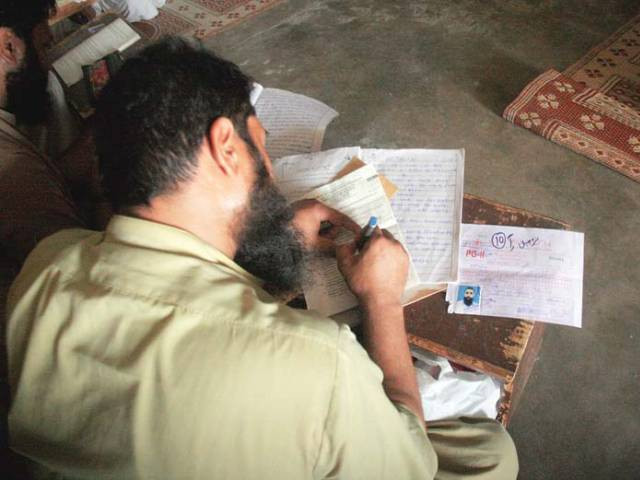400 inmates graduated last year in Punjab prisons, SC told
Automation of prison record under way, repot tells SC

The report maintained that efforts were being made to improve educational and skill training programme in prisons. PHOTO: EXPRESS/FILE
The report says all provincial prison departments – on recommendation of the Mohtasib – have initiated an automation process to ensure development of interface among jails, courts and the National Database and Registration Authority (NADRA) for monitoring and verification of the prisoners’ record.
The report, filed by the Mohtasib’s senior legal adviser Hafiz Ahsaan Ahmad Khokhar, is on status of implementation of its recommendations to improve the situation of prisons and it lays emphasis on linking the biometric system in jails with courts for maintaining prisoners’ record.
The Wafaqi Mohtasib Secretariat, it says, has also started working on prisoners’ welfare and payment of fines for those convicts who have completed their sentences as well as psychological counseling, education and vocational training to help integrate them into the society after their release from jails.
“A work plan has also been prepared at the Wafaqi Mohtasib Secretariat for Central Jail Haripur, Central Jail Quetta & Mach, Central Jail Lahore and Borstal Institute and Juvenile Jail Faisalabad and Central Jail Karachi with the help of international organisations to address the issues of women, juveniles and UTPs.
“[it is made] with the objective to provide legal assistance, availability of correctional psychiatric facilities and medical examination and improving infrastructure, furniture and other utilities relating to prisoners and to provide training to prison staff to enhance their capacity in carrying out their duties.”
It says the Higher Education Commission of Pakistan (HEC) has been advised to submit a comprehensive programme of education and skill training for prisoners and to also submit it to Wafaqi Mohtasib Secretariat with the coordination of respective universities.
“Further, it was also decided that the provincial governments would approach the respective universities to involve them in professional / skill training in jails,” it adds.
Sharing progress on its recommendation, the report says that in Sindh a memorandum of understanding (MoU) was signed between the Prison Department and UNODC on April 20 for developing and installing the Prison Management Information System (PMIS).
“NADRA has once again been requested to give access to the jail authorities to NADRA database for proper verification of identity of the prisoners as well as visitors....This automation of prison system may be connected with NADRA and the respective courts in the shortest possible time.”
The report says that in Punjab the inspector general of prisons, prosecution department and courts had developed independent IT modules and packages for automating their activities. However, there was no interface or link between them with the result that the prisoners’ attendance in courts was not being reflected through the system.”
It was discussed that the problem had arisen because rather than adopting a holistic approach, each department had worked in isolation. The need for integrating the criminal justice system under the umbrella of NADRA was emphasised.
“It has been advised that Home Department, Punjab Government would take lead in coordinating with the concerned departments – police, jails prosecution department – for developing a feasibility report/plan with timelines and execute a project to institute a biometric verification system for prisoners throughout the chain from the jails to the courts. Punjab Information Technology Board would also be taken on board for the project,” says the report.



















COMMENTS
Comments are moderated and generally will be posted if they are on-topic and not abusive.
For more information, please see our Comments FAQ